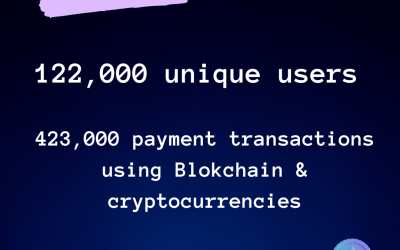
Gold and other precious metals have served as key investment avenues for those looking to hedge their bets against market trends. Because precious metals are rare, the supply remains low, which means that price tends to go up over time. Moreover, precious metal prices don’t follow the market. As a result, during market declines, the price either goes up as investors look for more stable investments or it increases in relative value as it stays steady and other assets decrease. All of this creates a robust market in precious metals. In 2020, under the economic pressures of the pandemic, investors flocked to precious metals with gold and palladium going up more than 20% in value, while silver went up 47% and platinum went up 10%.
Despite the hot market, precious metal vendors face a number of traditional payment issues that can both undermine their business as well as scare off investors. Specifically, vendors face chargebacks and fraud, as well as high overhead costs. Given the value of precious metal purchases, chargebacks and fraud are a major problem for vendors when things go wrong. At the same time, vendors face problems of efficiency, including processing times that can scare off customers from pulling the trigger on a purchase.
With its emergence as a high-value commodity, cryptocurrency has been referred to as “digital gold.” Much like precious metals, it offers an investment opportunity that is insulated from traditional markets. At the same time, crypto also comes with the added benefit that it is a currency that can be used in place of fiat currencies. And this is where it offers huge possibilities for precious metal vendors: it can solve the problems associated with traditional payment options, while increasing their market and decreasing overhead.
Ensuring Security, Avoiding Chargebacks and Fraud
Among the biggest pain points precious metal vendors face are chargebacks and fraud. These can be a tremendous drain on businesses generally, with chargebacks alone estimated to cost businesses $130 billion by 2023. Given their skyrocketing prices, precious metal vendors can expect to see chargebacks and fraud increase in the industry.
The problem with traditional payment options lies in the lack of security for payment information, which can be stolen or fraudulently used. In cases of chargebacks, credit card companies and banks place the liability on the vendor, who must then prove that a chargeback is not warranted. The same goes for fraudulent use of stolen credit card or banking information. With the value of precious metal orders possibly being in the hundreds of thousands of dollars, the failure to prove the chargeback false or of accepting a transaction made with stolen payment information can be catastrophic. Fraud can also occur as the result of payment processing times. Even if the bank transfer is a 1-day transfer, it can take up to 3 days for the vendor’s bank to confirm that they have the payment. But if the customer calls for an express order and there is a fraud claim, the money will be pulled from the vendor’s account even after the items have shipped.
To ensure the security of their transactions, vendors want to make sure that the customers have the money and the payment process goes exactly as planned. Crypto offers this security by allowing digital currency to be directly exchanged between vendor and customer, avoiding the gaps that are created by intermediaries processing payment. Because of this direct relationship, the vendor can place responsibility on the customer to prove a chargeback is warranted. At the same time, because crypto removes the times associated with intermediary payment processing, there is no time lag for fraudulent users to exploit. This assures that the money is transferred and that the transfer is not reversible. Ultimately, as a vendor, money is in your account and you are no longer liable for mistakes or malicious actions on the customer’s part.
To avoid fraud through traditional payment processing options, precious metal vendors often have to use complicated security measures. But these create the additional problem of making the purchasing process difficult and time-consuming for the customer. This leads to cart abandonment – a situation where customers place items in their cart, but decline to complete the purchase because of the difficulty of completing the transaction or concerns about fraud and security for their payment information. With crypto, customers don’t have to provide credit card or bank account numbers. They can pay directly from their crypto wallet, which is the equivalent of paying with cash. This prevents identity theft or fraudulent use of payment information. It also provides ease of use: customers simply have to send the crypto payment information and the transaction is completed without processing times or the need for multiple identity verification steps.
Broadening Markets, Lowering Overhead
Precious metals and crypto have both become attractive to customers looking to capitalize outside of traditional markets. This means that there’s a market overlap and customers buying precious metals are also buying crypto. Offering the ability to pay in crypto draws in customers who might not otherwise purchase products with traditional payment options. But allowing payment through crypto broadens the customer base in additional ways. First, there’s no purchase price limit. Given the value and volume of possible investment purchases in precious metals, credit card or bank transfer purchases can be limited if there is a credit limit. Crypto is a currency and as long as the customer has the currency there is no credit limit. Moreover, crypto is a borderless currency, which allows anyone from anywhere to purchase products. This avoids the problem of declines if a customer’s nationally based credit card doesn’t allow for purchases in the precious metal vendor’s country of operation. Because of the growth in precious metal values, accepting crypto allows customers from anywhere in the world to capitalize on this boom.
Of course, broadening markets often comes with a cost in the form of payment processing fees, including for international exchange rates. Credit companies charge a 2-3% processing fee for precious metals. Plus, if a customer is paying with a foreign currency, there’s the additional cost of currency exchange fees. Crypto cuts out these fees. On the one hand, crypto fees can be below 1%. On the other hand, there is no exchange rate because vendors receive a borderless currency directly from the customer, with same day fund settlement times. This lowers margins, without the wait times that can come with bank transfers.
RocketFuel for Precious Metal Payment Processing
While precious metals offer a booming market, capitalizing on the possibilities of “digital gold” can alleviate traditional pain points in the industry. Because it cuts out intermediaries, crypto offers a more direct relationship between vendor and customer, which avoids the problems associated with chargebacks and frauds. At the same time, it broadens a vendors’ customer base and lowers overhead costs.
Fully capitalizing on crypto’s possibilities, requires state of the art blockchain technology. RocketFuel’s next generation blockchain technology offers a low-fee, hassle-free crypto payment option that accepts more than 120 cryptocurrencies. Finally, it’s easy to use drop down menu provides security and ease of use for customers, which avoids cart abandonment.





